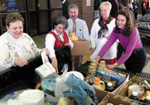Therapeutic Services ‘gives back’ to Crisis Ministries
by Cindy AbolePublic Relations
In the same spirit of pilgrims celebrating their first harvest in the New World, the staff of MUSC Therapeutic Services have harvested their own generosity. They have collected foods to provide many of the Lowcountry’s homeless with warm meals this holiday season.
 Therapeutic
Services' Jo Anne Sandefur, left to right, Ann Benton, Mark Williams, Eva
Petenbrink, and Maureen Decker huddle around one of two truck loads of
canned vegetables, meats, fruit and fruit juices, paper products and other
non-perishible items collected from their staffs since Nov. 1. Their generous
actions will help support needy individuals and families through Crisis
Ministries.
Therapeutic
Services' Jo Anne Sandefur, left to right, Ann Benton, Mark Williams, Eva
Petenbrink, and Maureen Decker huddle around one of two truck loads of
canned vegetables, meats, fruit and fruit juices, paper products and other
non-perishible items collected from their staffs since Nov. 1. Their generous
actions will help support needy individuals and families through Crisis
Ministries.
The idea was the brainchild of respiratory therapy’s education coordinator Jo Anne Sandefur and other respiratory therapists. It is an extension of the area’s holiday food service project. Sandefur saw the positive effects and lead efforts to expand it to include 461 staff in 13 areas and departments.
Department managers quickly got together to decide which non-profit agency would benefit from their cooperative support. They chose Crisis Ministries because it was an agency that was well-known to staff who have discharged patients to some of their many programs.
“Choosing them was easy because of our already continuous working relationship with them,” Sandefur said. “They are an organization that is close to our hearts. Helping them gives us a chance to give back.”
Created in 1984, Crisis Ministries was established to help meet the immediate needs of the Charleston community’s homeless and hungry. The organization serves an estimated 180,000 meals per year, where more than 80 percent is prepared and served by volunteers.
With more than 5,000 volunteers, Crisis Ministries receives support with their seven-days-a-week soup kitchen, food rescue program, family center, men’s shelter, social work services and health clinic.
To help determine their specific needs, Sandefur contacted Crisis Ministries director Gail Smith concerning their plans and learned of their need to help restock items in their food pantry for the upcoming holidays. The project ran from Nov. 1 to 25.
“This type of donation is very needed particularly that our numbers in need continue to go up,” said Smith, who confirmed that the donation will be used to support their food and at-risk support programs. “We’re happy to receive it as a gift expressed by caring people who want to show their compassion during the holidays.”
Departments were assigned specific food groups and non-perishable items. For example, occupational therapy and speech language staff were asked to bring cereal items, while 7West and TCU staff contributed canned meats like tuna, corned beef, chicken and Spam.
In the physical therapy areas of the main hospital, Rutledge Tower, Charleston Memorial and their West Ashley locations, it’s not unusual to see the collection boxes brimming over with canned vegetables. Everyone is showing their support by donating items.
“The project is so easy for us because we know it brings significant
results,” said Erica Rouvalis, physical therapy manager who works with
a staff of 55 people both on-and-off campus. “Participating in this effort
brings extra joy to everyone.”
Catalyst Online is published weekly, updated as
needed and improved from time to time by the MUSC Office of Public Relations
for the faculty, employees and students of the Medical University of South
Carolina. Catalyst Online editor, Kim Draughn, can be reached at 792-4107
or by email, catalyst@musc.edu. Editorial copy can be submitted to Catalyst
Online and to The Catalyst in print by fax, 792-6723, or by email to petersnd@musc.edu
or catalyst@musc.edu. To place an ad in The Catalyst hardcopy, call Community
Press at 849-1778.